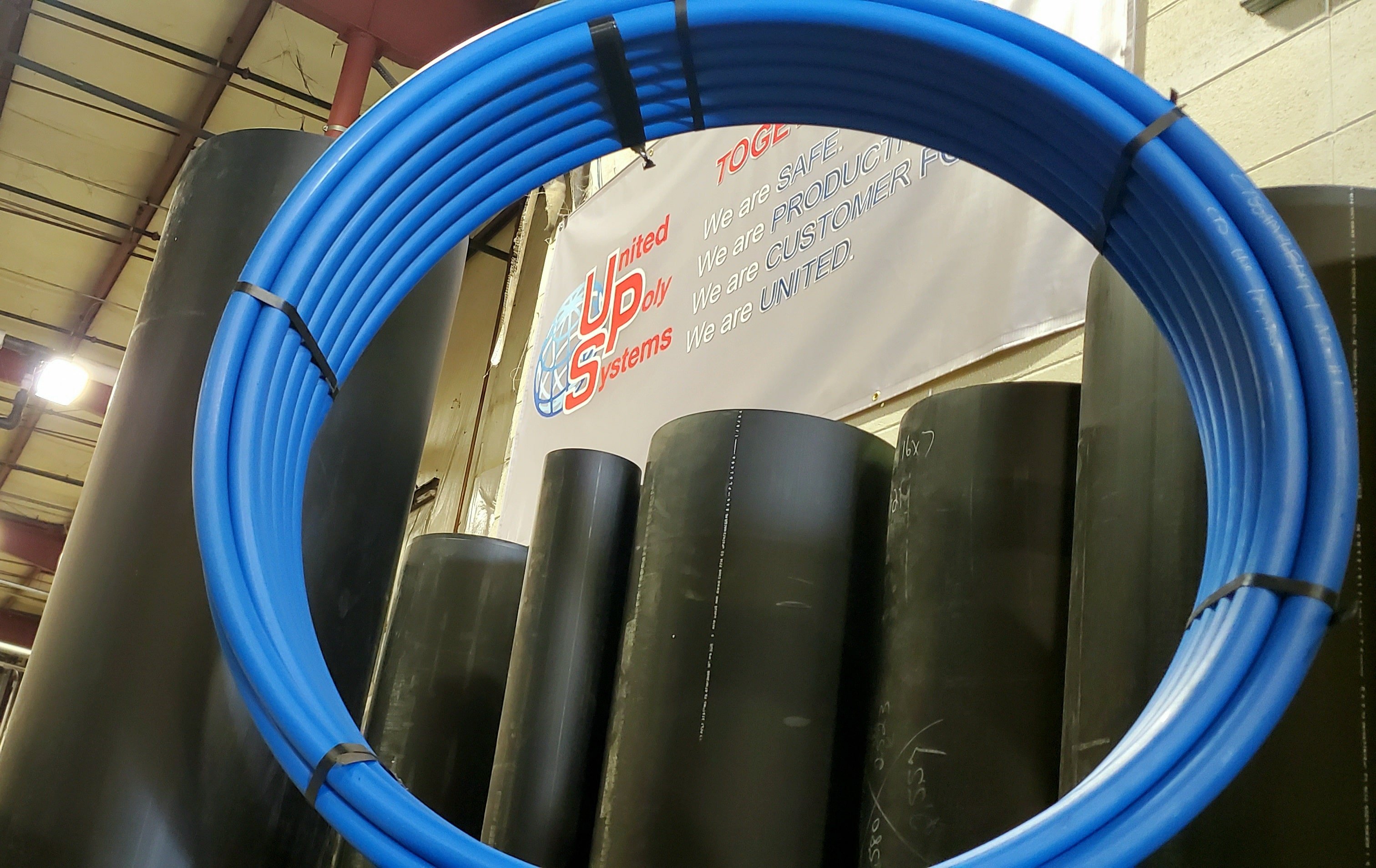Exploring American Plastics HDPE Pipe Manufacturing and Its Impact in Modern Infrastructure
Wiki Article
Understanding the Secret Benefits of HDPE Pipe for Water and Wastewater Administration
The usage of HDPE pipeline in water and wastewater management provides many benefits that merit consideration. Its outstanding durability and lengthy life-span make it a favored choice for lots of projects. In addition, the material's resistance to deterioration and chemical damages boosts its dependability in numerous settings. The benefits extend beyond just long life and resistance. custom hdpe pipe manufacturing Midland TX. Discovering its cost-effectiveness and ecological influence discloses a lot more engaging reasons for its extensive adoption in modern-day frameworkExtraordinary Sturdiness and Durability

HDPE pipe sticks out for its phenomenal toughness and long life, making it a recommended selection in water management systems. Constructed from high-density polyethylene, these pipelines can stand up to significant stress and stress and anxiety, making certain trustworthy performance gradually. Their robust nature permits them to endure extreme ecological problems, consisting of temperature level variations and soil motions, which can trigger various other products to stop working.
The life expectancy of HDPE pipes typically surpasses half a century, supplying an affordable remedy for municipalities and sectors alike. Furthermore, the product's lightweight buildings streamline setup, minimizing labor expenses and durations. This resilience reduces the need for frequent repair work or replacements, additionally improving its financial allure.
In water monitoring applications, the integrity of HDPE pipelines implies fewer interruptions and enhanced solution connection, making them integral to sustainable facilities development. The combination of resilience and longevity strengthens HDPE's duty as a foundation in effective water monitoring services.

Resistance to Deterioration and Chemical Damage
While many products catch rust and chemical damage over time, HDPE pipes show impressive resistance, making them perfect for various water monitoring applications. This resilience comes from the molecular structure of high-density polyethylene, which is inherently non-reactive and does not corrode like metals or deteriorate from direct exposure to rough chemicals. Consequently, HDPE is highly efficient in environments with aggressive materials, such as wastewater systems that may have acids, bases, and natural solvents.
In addition, HDPE pipelines can hold up against environmental factors such as dirt acidity and saline problems, better boosting their viability for diverse applications (Texas hdpe pipe manufacturer). Their ability to preserve architectural stability in time lowers the threat of leaks and failures, which is important in making sure the safety and security and integrity of water circulation and wastewater management systems. Consequently, the resistance to rust and chemical damage noticeably adds to the total efficiency and durability of HDPE piping services
Cost-Effectiveness and Economic Advantages
When thinking about the economic effects of water monitoring systems, the cost-effectiveness of HDPE pipelines ends up being obvious. These pipelines supply reduced installment and upkeep prices compared to typical products like steel or concrete. Their lightweight nature streamlines transport and setup, leading to decreased labor costs. Furthermore, HDPE pipelines show a long lifespan, often exceeding 50 years, which equates to less replacements and long-lasting savings.Additionally, the resistance of HDPE to deterioration and chemical damages reduces the need for costly repairs and substitutes. The pipelines also sustain efficient water circulation, minimizing power costs connected with pumping systems. By reducing leakages and water loss, HDPE pipes add to considerable financial advantages for districts and markets alike. In general, the first financial investment in HDPE piping can produce considerable monetary returns over the life-span of the water administration system, making it a sensible option for lasting infrastructure growth.
Environmental Sustainability and Lowered Effect

Convenience and Adaptability in Installation
As a result of their distinct homes, HDPE pipelines provide amazing convenience and adaptability in setup, making them appropriate for a vast array of applications. Their light-weight nature allows for much easier handling and transportation, lowering labor costs and installment time. HDPE pipelines can be bent and formed to fit numerous surfaces and project demands, which is especially helpful in testing settings.Additionally, their resistance to corrosion and chemical damages enables setup in varied settings without the need for specialized safety layers. The capacity to fuse joints produces a continuous, leak-free system, improving the general integrity and reliability of the installation. HDPE's flexibility also suits ground movement, reducing the threat of damages in areas susceptible to changing dirt. Generally, these attributes make HDPE pipelines not just versatile however also a recommended option for water and wastewater monitoring systems.
Regularly Asked Inquiries
Exactly How Does HDPE Pipeline Compare to PVC in Water Monitoring Applications?
HDPE pipeline uses remarkable flexibility, resistance to deterioration, and durability compared to PVC. Its lighter weight promotes easier installation, while its long life expectancy reduces replacement costs, making HDPE a favored option in water administration applications.What Is the Life-span of HDPE Pipes Under Normal Conditions?
Under normal problems, HDPE pipelines can have a life-span varying from 50 to 100 years. Their resilience and resistance to deterioration add to their lasting efficiency in numerous applications, making them a trusted option for infrastructure.Are HDPE Water Lines Recyclable After Their Service Life?
Yes, HDPE pipes are recyclable after their life span. American Plastics HDPE Pipe for Oilfield. They can be refined and repurposed into brand-new items, greatly minimizing environmental impact and promoting sustainability within the industry, making them an environment-friendly choice for piping optionsWhat Is the Installation Process for HDPE Pipes?
The installment procedure for HDPE pipes includes site prep work, trenching, pipeline combination or mechanical joining, backfilling, and stress screening. Proper strategies guarantee a sturdy and reliable system for transporting water and wastewater properly.Can HDPE Water Lines Be Made Use Of for Both Potable and Non-Potable Water Systems?
Yes, HDPE pipelines can be made use of for both drinkable and non-potable water supply. Their convenience, toughness, and resistance to rust make them suitable for different applications, guaranteeing safe and efficient transportation of water in various contexts.Report this wiki page